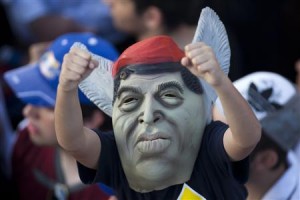 Venezuelans packed supermarkets on Friday to stock up on food and other essentials in case of trouble around Sunday’s presidential vote, which was shaping up as the biggest electoral challenge of Hugo Chavez’s 14-year rule.
Venezuelans packed supermarkets on Friday to stock up on food and other essentials in case of trouble around Sunday’s presidential vote, which was shaping up as the biggest electoral challenge of Hugo Chavez’s 14-year rule.
Energetic young state governor Henrique Capriles has gained momentum in the closing days of the campaign and he seemed to have the opposition’s best chance of unseating Chavez since the socialist president came to power in 1999.
Many among the South American oil exporting nation’s 29 million people are fretting that tight results could bring accusations of fraud and protests in an already highly polarized society awash with illegal arms.
“I have to think about my family, there could be violence, anything is possible in this country,” said housewife Dayana Alvarez, 38, among scores of shoppers buying cooking oil, powdered milk, candles and flour in a teeming Caracas supermarket.
Some stores and pharmacies have run short of staples like pasta, coffee, toilet paper, rice and milk.
“I’ve been buying a little every day. You have to be prepared. Who knows what is going to happen?” Maria Eugenia Maduro, a 38-year-old administrator at a computer company, said at another store in a wealthy district where Capriles’ support is strong and nervousness over potential trouble is high.
ELECTRONIC BALLOT
In the run-up to the election, three opposition activists were shot dead at a rally, and there were isolated outbreaks of gunfire and rock-throwing at some events. But there was none of the sustained violence some had feared the campaign could bring.
Both sides have voiced confidence in the electronic ballot system, will be sending witnesses to the 13,700 voting centres, and have said they will accept the election board’s ruling.
“We have been and will continue to be respectful of the established processes,” Capriles’ campaign coordinator, Leopoldo Lopez, told reporters on Friday. “We call for peace and tranquillity.”
Yet with a tight result likely the potential for disputes grew. Supporters of either candidate may be reluctant to accept defeat.
No formal international monitors are allowed, though the UNASUR group of South American nations and U.S.-based Carter Center will have teams in Venezuela watching.
Chavez, 58, has repeatedly said the opposition is preparing violence to swing the result, while his most strident critics say he may balk at handing over power should he lose.
A majority of the nation’s half a dozen or so main pollsters put Chavez ahead, but the 40-year-old Capriles’ numbers have been creeping up, and two pollsters give him a slight lead.
Illustrating the uncertainty over the vote, two Wall Street banks gave different views on Friday. Credit Suisse said Chavez had the advantage and Barclays said a Capriles win was now likely.
Capriles’ aides are convinced he has had a late surge which, combined with what they say is a “fear factor” of many voters afraid of expressing open opposition to Chavez on concerns of losing their jobs, mean there is a real chance for an upset.
“President Chavez, I thank you for all you have done well. And for all you have done badly, history will judge you,” Capriles told hundreds of thousands of supporters at his closing rally in Lara state on Thursday night.
“Your cycle has finished.”
Making a mammoth personal effort given his recent cancer surgery, Chavez wound up his campaign at the same time speaking to red-clad supporters at a similarly vast rally in Caracas.
“The very life of Venezuela is at stake,” he roared in a typically emotional final appeal.
Sunday’s ballot is a critical not just for Venezuelans, but also for various other nations around Latin America where Chavez has helped bolster left-wing governments from Cuba to Bolivia with cheap oil and other aid.
Though distracted by its own upcoming presidential election in November, the U.S. government will also be quietly hoping to see the back of its most vociferous critic in the region.
If he wins, Chavez promises to deepen his socialist crusade in Venezuela, meaning there may be more nationalizations on the cards for the health, bank or food sectors. The possibility of a recurrence of cancer will, however, hang over him.
The former soldier, who survived a short-lived coup in 2002, has developed a near Messianic following by casting himself as an heir to 19th century liberation hero Simon Bolivar while pushing billions in oil revenue into anti-poverty programs.
A win for Chavez could prompt a sell-off of Venezuelan bonds, which have risen steadily since June and jumped in recent weeks as investors bet on a possible Capriles win.
Capriles, who admires Brazil’s model of respect for private enterprise with strong welfare protection, has run a marathon eight-month campaign of house-by-house visits that have galvanized the historically fractured opposition like never before.
He is promising attention to grassroots problems like crime, unemployment and shoddy services.
Reuters
Photo: A supporter of the Venezuela’s opposition presidential candidate Henrique Capriles wears a mask depicting Venezuela’s President Hugo Chavez during a campaign rally in Barquisimeto, in the state of Lara October 4, 2012. REUTERS/Marco Bello

Leave a Reply
You must be logged in to post a comment.